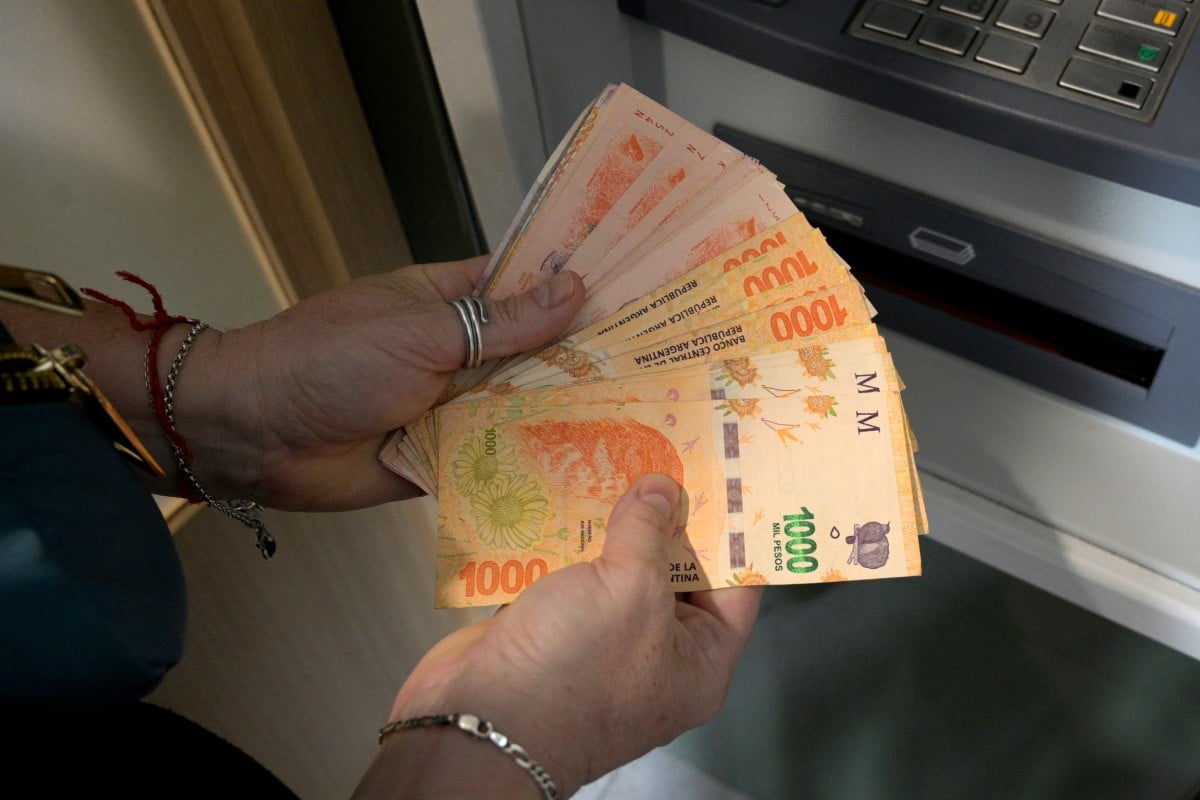ye7 Recession-hit Argentina gripped by ‘Ponzidemia’


A woman withdraws Argentine pesos from an ATM machine at a bank in Buenos Aires on November 4, 2021. FILE PHOTO/Agence France-Presse
BUENOS AIRES — A quiet Argentine town best known for its oranges has become the symbol of a Ponzi scheme plague sweeping the crisis-hit nation that has cost thousands of people their savings.
Nearly 30 percent of the population of San Pedro, a town of 70,000 people situated about 170 kilometers (106 miles) north of Buenos Aires, fell for an investment app peddled by two actors posing as businessmen that promised up to 2 percent daily returns paid in cryptocurrency.
Article continues after this advertisement“I trusted it, as did some in my family,” Carlos Rodriguez, a 66-year-resident, told the Cadena 3 radio station, adding that the RainbowEx app showed him earning $80-100 a day, nearly doubling his income.
FEATURED STORIES BUSINESS BIZ BUZZ: Low-key search for new PNB CEO on BUSINESS From noodles to cake to ‘lechon manok,’ Fruitas on buying spree BUSINESS Trump victory might prompt more BSP cutsREAD: Argentina recession deepens with 1.7% contraction in Q2
But the dream of easy money in a country battling a severe recession and three-digit inflation soon turned to dust.
Article continues after this advertisementRodriguez lost nearly all his savings.
Article continues after this advertisementHe is one of between 15,000 and 20,000 people in San Pedro who invested in the platform, the town’s mayor Cecilio Salazar told the Radio 10 station.
Article continues after this advertisement Thousands of victims“We’re looking at a $49 million scam,” lawyer Adolfo Suarez Erdaire, who represents around a hundred alleged victims, told AFP, adding that he had “calls coming in from all over the country.”
Two Argentine nationals have been arrested in connection with the case.
Article continues after this advertisementA Ponzi scheme is a fraudulent scheme where new investors’ money is used to pay off old investors until the flow of new money dries up and the enterprise collapses.
READ: Argentine economic activity plunges amid austerity drive
Similar suspected scams were also reported recently in Chubut and San Juan provinces in the south, Santa Fe province in the center and Cordoba in the north, all involving another platform, Peak Capital, which closed on October 18.
“There are thousands of victims,” the Chubut prosecutor’s office said, adding that the amounts swindled ran into the millions of dollars.
“There is an epidemic,” Maximiliano Firtman, an IT expert, who investigated RainbowEx, told AFP.
‘La China’Firtman followed the platform’s trail to a luxury hotel in Buenos Aires, where two men presenting themselves as US executives gave a talk last month to potential investors.
The businessmen were in fact Polish actors who were hired by an agency to play the part of slick money men. The scandal made headlines around the country.
RainbowEx, which claims to be based in Singapore, halted its operations in Argentina two weeks ago and demanded $88 from users to be able to withdraw their funds.
Many paid the money but did not recoup their investment.
The revelations come as Argentina’s economy sinks deeper into recession after months of tough austerity measures prescribed by libertarian President Javier Milei to tame one of the world’s highest inflation rates and erase a deep budget deficit.
More than half of the population of Latin America’s second-biggest economy now lives below the poverty line.
Becoming a teen millionaireThe scams are “taking advantage of the crisis,” said Firtman.
He added that young people, who are disproportionately affected by poverty — 60,7 percent of Argentines aged 15-29 are officially considered poor — were driving what he called a “Ponzidemia.”
“There are 19-year-olds who are teaching 16-year-olds how to become a millionaire in three months” through investment platforms, he said.
Sociologist Ezequiel Gatto linked the youth speculation craze to gaming.
“There’s been a gamification of money,” he told the Pagina 12 newspaper, noting that the interfaces of some investment apps resembled those of video games.
The scams come in different forms.
On Wednesday, a deepfake of Argentine football star Lionel Messi promoting a scheme to turn $75 into $2,000 in a week began circulating on social media.
“You don’t need to be an economy expert or markets connoisseur,” the fake Messi says, inviting potential investors to join a Telegram group.
The most notorious alleged scam was started by self-styled Argentine financial guru Leonardo Cositorto, who convinced thousands of people across Latin America and Spain to invest in everything from cryptocurrency to hamburger restaurants and car dealerships.
Investigators claim that Cositorto, who promised returns of 7.5 percent per month in dollars and inspired a Netflix documentary, led a giant pyramid scheme, which he denies.
Subscribe to our daily newsletter
He is currently on trial for fraud.ye7
READ NEXT Indonesia bets on SE Asia’s first battery plant to becom... HSBC finds PH in sweet spot EDITORS' PICK Kristine claims 100 lives, death toll likely to rise Quezon City wins back-to-back PCCI, Galing Pook awards Leon may develop into severe tropical storm or typhoon DA: Kristine caused P3.11B agricultural damage LIST: Water service interruptions in NCR, Rizal from Oct. 28 to 31 Catholic Church assembly acknowledges ‘obstacles’ for women MOST READ Comelec: No excess ballots for 2025 polls Duterte expected as Senate drug war probe begins PhilHealth’s fault LIST: Water service interruptions in NCR, Rizal from Oct. 28 to 31 Follow @FMangosingINQ on Twitter --> View comments